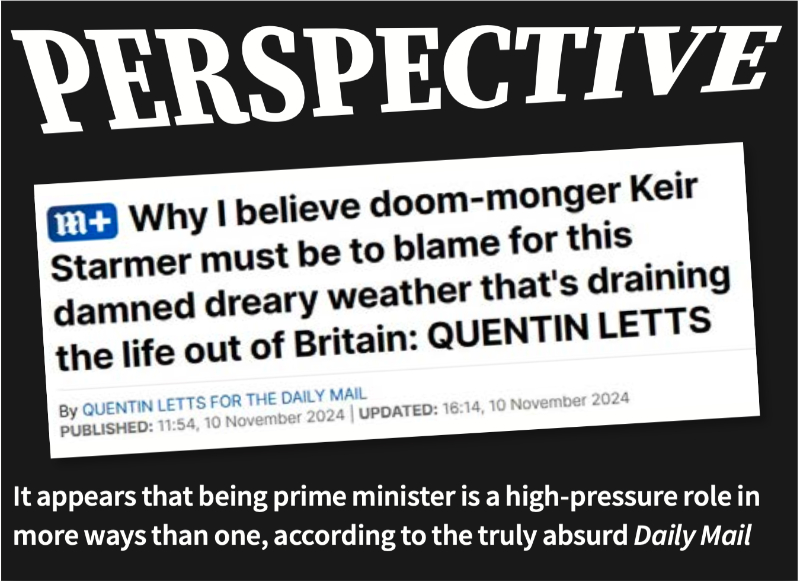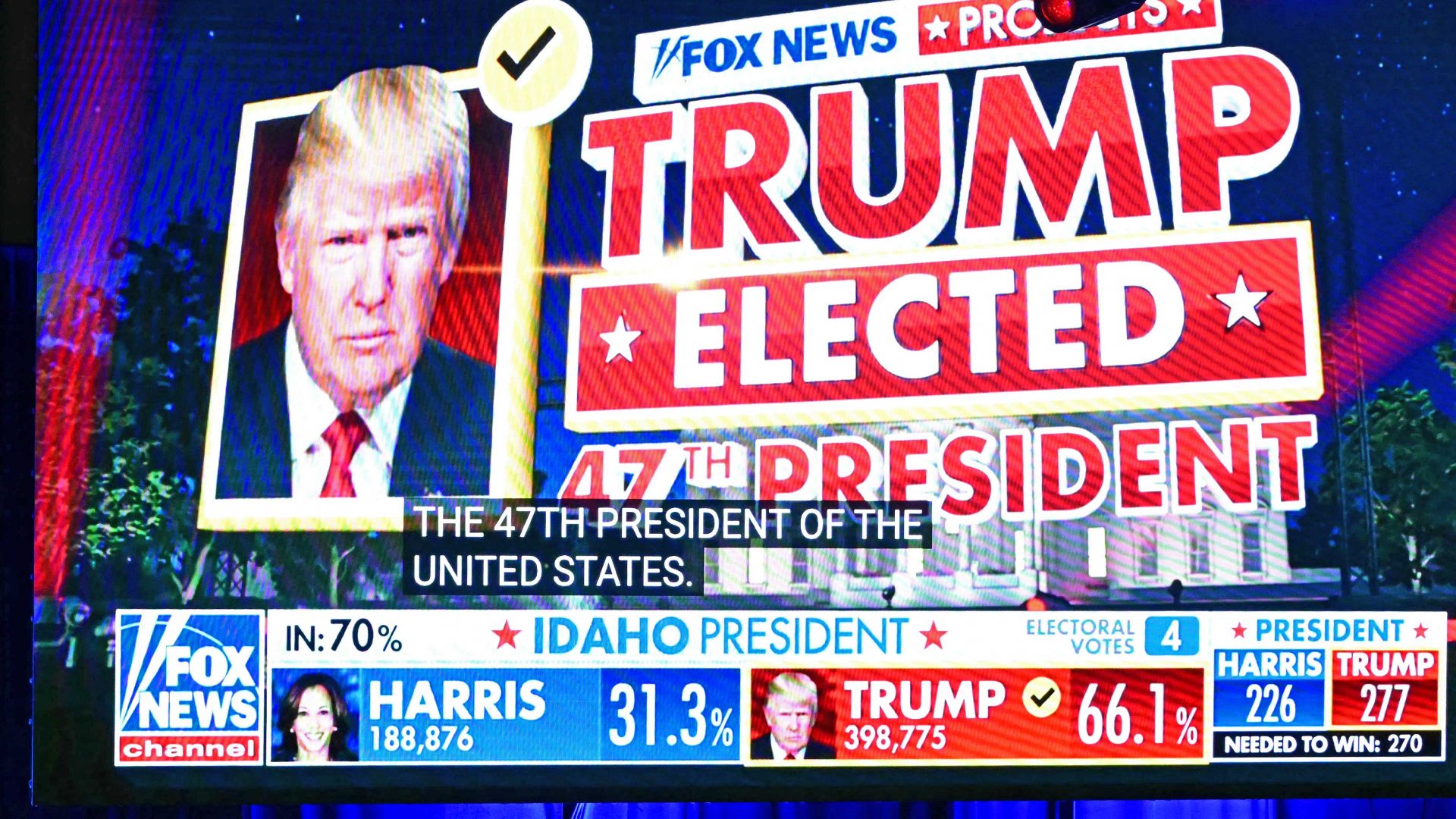“Where the darkness prevails” by Matthew d’Ancona (TNE #411) was an excellent article on Donald Trump’s victory.
There is a strong urge to comfort ourselves with the idea that this will pass; that in four years’ time, Trump will be gone and we can return to democratic business as usual and all shall be well. But if the American public does not become disillusioned or repelled by the actions of the second Trump administration, there’s every reason to believe they’ll vote for another candidate in 2028 who promises to perpetuate the fascist agenda, and vote for them again in 2032.
Make no mistake, many Americans liked what they saw the first time round and have just voted for more of the same, but this time turbocharged by Trump’s MAGA appointees.
Jeff Morton
The lesson we need to learn from this disaster in the USA is the need to ensure greater equality. There is a growing group of voters in the UK with little hope for the future. This includes not just the poorest and least well-educated, but also many young educated people who cannot afford a decent secure place to live or to have a family. Where is their future?
Meanwhile the Tories enabled the “few” to get ever more obscenely rich and avoid paying tax. Unless this disparity is addressed by the current government so the majority of young people have secure, affordable homes and a future to look forward to, we could have a similar disaster in the UK.
Sally Churchill
In the lead-up to the US election in November 2016, many of my work colleagues asked my opinion since I was the office’s token US expat.
At that time, my best observation was that Hillary Clinton needed to figure out how to talk to the “left-behind” voters, such as those in marginalised areas or industries. I used as an example the question of how a political candidate in South Yorkshire should speak to all the ex-miners (and their families) who have not had a decent job since the pits closed.
None of my colleagues had the answer, and neither did Clinton, who lost the “left-behinds” and the election to Donald Trump.
I felt the same thing happening this year. Too many of Kamala Harris’s appearances could be characterised as preaching to the choir. There was a sense that showing up to a crowd of supporters, possibly with a star (Beyoncé, Michelle Obama), would be enough to win.
Kamala’s campaign was missing a focus on the relatively few voters who could actually be swayed by policies, advertisements, or events. I didn’t see any attempt to entice opposition voters to join the Kamala campaign.
Instead, I saw celebrations rejoicing that the Clooneys and Oprah said that they supported Kamala. I saw celebrations that Taylor Swift considered herself a single cat lady. What I did not see is how the “single cat ladies” label would engage those ladies who clean bathrooms at Motel 6 in rural Wisconsin for minimum wage.
In summary, I didn’t see any attempt to engage with the “left-behind” voters in a way that honoured their lives and offered some hope for improvement such as to gain their votes. And thus we find ourselves where we are.
Terry Layman, Chaddleworth, Berkshire
Can a future issue include an article on how to deal with despair?
Claire Hill
Democrats were rightly positive about the amount of enthusiasm surrounding, for example, activists’ door-knocking. What they failed to realise was that Elon Musk was already “in the house” intimately and 24/7.
Putting aside the ongoing problem of the sane-washing of mad situations and people by the legacy media, the only genuinely unpleasant shock about the US election is that half of voters in the US love that yummy misogyny just as much as the racism. And they got it in bucketloads from MAGA.
This is not just the post-truth world, it is one of post-empathy.
Amanda Baker, Edinburgh, Scotland
I’m actually surprised how I feel about the US election result. I was determined not to catastrophise and so far that wall is holding. I have to accept that, despite feeling enormously frustrated and angry, I had no vote or power to control this event so I must live with it.
For me that means focusing even more care, love and attention on my nearest and dearest and continuing to extend care and kindness to those I meet, especially those who are “different” in some way to the bullying white males who seem now to be in the ascendant.
So many of those people must be genuinely frightened.
Curiously Trump’s triumph feels like our WWII moment in that a tangible enemy has come sharply into focus and all of us who count ourselves as decent, progressive, liberal and tolerant must now fight when the base instincts that fuel Trump and his base intrude into our own lives.
Farage, Reform and the extremes of the Tory party and press will be completely stoked and energised by this. That’s where our resistance must start.
Driver Andy, Northampton, Northants
Alexis de Tocqueville unravelled the great mystery of the 2024 American election back in 1840.
In his Democracy in America the very first line is: “There is not, I think, a single country in the civilised world where less attention is paid to philosophy than in the United States.” And a few chapters later he singles out their unusual passion for material well-being.
The minds of Americans, he wrote, are “universally preoccupied with meeting the body’s every need and attending to life’s little comforts.” Imagine if he had visited them today.
Oh, and by the way, the recurring theme in Democracy in America is de Tocqueville’s fear that American democracy will lead to populist tyranny and dictatorship.
Tim Isaac, Putney, SW15
When Donald Trump moves back into the White House we can say goodbye to any further support for Ukraine. So, Europe has two months to get its ducks in a row. And Keir Starmer should use that time to reset and strengthen links with Europe, not “make Brexit work”.
Even fools like me, who voted for it, can see that Brexit is a failure. I’m sure Starmer is no fool but he needs to prove it by rethinking his Europe strategy.
Allan Jones

Taxing times for farmers
Re: “The end of more for less” (TNE #411). Surely Jonty Bloom can see that there is a world of difference between James Dyson’s 36,000 tax avoiding acres and the small family farms that in Wales form the backbone of the precious Welsh language and culture?
A tax system that cannot make that distinction is a failure, and so is the political system of the British state that has devised it. Inflation has swept many family farms into Rachel Reeves’s new inheritance tax threshold, threatening the social structure of our rural communities.
The case for an independent Wales and Scotland grows stronger by the day.
Dafydd Williams, Abertawe, Cymru
From Badenoch to worse
Re: Paul Mason’s “Kemi Badenoch is mediocrity on steroids” (TNE #411). It is political kamikaze by the Tories and a complete failure to understand why they lost the election.
They’re a far sight away from the party of Conservatism they once were. They’re populists, not credible, and openly anti-British when it comes to law and our international reputation.
Jack Millard
Is austerity filling jails?
I thoroughly enjoyed reading Patience Wheatcroft’s “Prison doesn’t work” (TNE #410). But two questions:
One, does anyone truly believe that with cost of living, rent prices, our rivers being poisoned, that prisoners are high enough up the political agenda to warrant sympathy from the public and thus justify the much-needed reform?
Two, are we also treating symptoms and not just causes? With defunding and austerity affecting so many aspects of UK life, is it any wonder that the prisons are overflowing?
Josh Green
Short-term sentences do nothing at all to reduce reoffending and only add to the cost of looking after prisoners. If it were agreed that only long-term offenders were imprisoned, and that tagging and probation officers were both substantially increased, it would make prison easier to manage, more cost effective, and encourage those serving sentences to develop skills for which training would be more readily available, again reducing the chances of reoffending.
David Nelson, Wilmslow, Cheshire
Tackling the water crisis
Congratulations on your excellent Feargal Sharkey-edited issue on the gross mismanagement of our water resources in recent decades (TNE #410). But let us not be dewy-eyed about the condition of those same resources before privatisation, for they were just as dire.
Due to Brexit, we no longer have the EU Commission to police non-compliance with decent water quality standards. Renationalisation of the water industry without much more would thus be a hugely expensive folly that could easily just take us back to the dire state of our waters as they were in the 1970s and 80s.
Instead it is vital we have a properly funded regulator with a duty to ensure compliance, which is totally independent of government and answerable only to parliament.
Richard H Burnett-Hall, London W11
While praising Becky Malby (TNE #410) for her achievements at Ilkley, we have adopted a direct course of action with our own water and sewage contractor. We now pay 50% of the sewage costs.
Come the day when millions of us follow that path, the share values will be flushed away and public ownership will be affordable. Democracy at work.
Neil Davies, Brixham, Devon
Re: “Thatcher started the water scandal” (TNE #410). One of the problems was that water privatisation followed on from the telecoms sector, where BT was privatised on the relatively successful RPI-X pricing formula. The obvious difference was – and remains – that telecoms offer plenty of scope for competition, and changing technology offers substantial scope for lowering of costs. This also gave Oftel – as it then was – the ability to run relatively light touch regulation. Ofwat never had any such luxury.
Stephen Locke
Scuppered, by George
Nicholas Pope (Letters, TNE #410) opines that “had the economic tsunami peddled by George Osborne” happened, more people might have voted Remain. Perhaps.
As someone then actively involved in the hitherto credible Remain campaign, Osborne’s reckless intervention totally wrecked our credibility. Leave instantly fastened on to the Osborne/Cameron gaffe and, thus, Project Fear was born, thereby emasculating those of us who had worked hard to establish a credible Remain narrative.
From then on, we were taunted with “you’re all exaggerating”. At a stroke, the prime minister and chancellor had lowered themselves (and the whole Remain campaign by implication) to the level of Johnson and Farage. Spare me!
Ken Daly

BELOW THE LINE
Comments, conversation and correspondence from our online subscribers
Re: “The EU is baffled by the budget and Starmer” by Patience Wheatcroft (TNE #411). I think many of us are also baffled by the government’s position.
We understand that during the election Labour did not want to spook its traditional working-class base, whose minds have been so thoroughly poisoned against the EU. But we expected that after gaining power, Labour would begin the task of winning over the hearts and minds for the idea of rejoining the EU.
No such charm offensive seems in the offing and it appears that Labour believes that it can improve the lives of working-class voters enough to stop them deserting to Reform at the next election without rejoining any EU institutions. This belief is baffling and bordering on the insane.
Mark Grahame
Starmer is the barrister briefed to argue a specific position. His absurd position on the EU demonstrates this at every turn.
The economy is screaming for our return, and a true majority want to be EU members, a point he ignores.
Only the gift of Tory incompetence and corruption have let him get away with his own incompetence.
Lauren Smith
If Labour wanted to rejoin the EU or the single market, it would either have to hold a referendum on it in this parliament, or fight the next election on that platform.
Viewed from now, neither make any political or for that matter, economic sense. If we are to rejoin the EU, there will have to be a process of re-education by osmosis over at least a decade or so. It hasn’t even started. Britain can look to Europe for cooperation on a wide range of subjects and a paper like TNE can promote understanding with Europe which is much needed. But TNE will consign itself to irrelevance if it can’t think beyond the trauma of 2016 and wants to go back to a 2015 world that has gone forever.
Austin Thompson
It turns out the £100bn many of us thought Brexit is costing us year-on-year is now nearer to £130bn.
Former Italian PM Romano Prodi reckons we’ll be back in the EU within 15 years. That’s an eye-watering sum down the drain in the meantime, all because our political leaders are too scared to level with us about the extent of the Brexit disaster.
Phil Green
JOIN THE CONVERSATION
Subscribe and download our free new app to comment and chat with our writers



